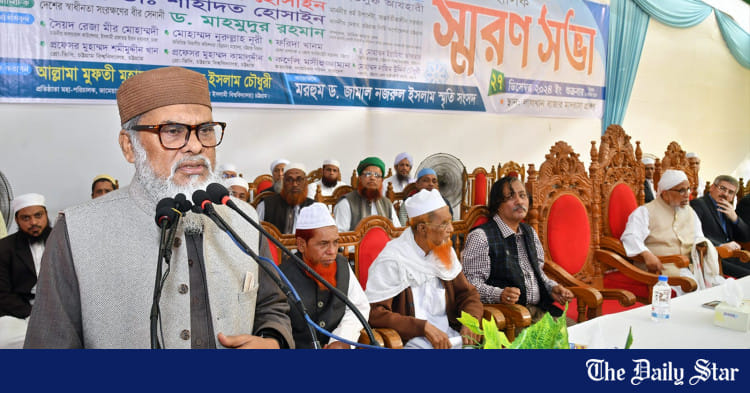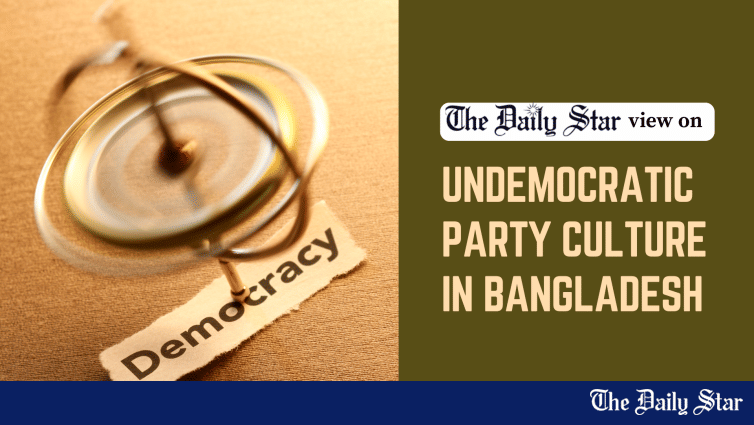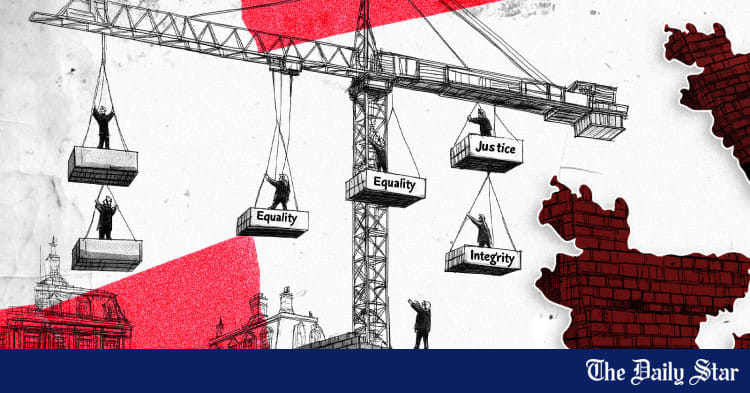Saif
Senior Member
- Joined
- Jan 24, 2024
- Messages
- 16,170
- Likes
- 8,063
- Nation

- Axis Group


Those prioritising reforms over polls have evil intentions: Rizvi
BNP Senior Joint Secretary General Ruhul Kabir Rizvi yesterday alleged that those who prioritise reforms over elections and democracy have evil intentions
Those prioritising reforms over polls have evil intentions: Rizvi

Ruhul Kabir Rizvi. File photo
BNP Senior Joint Secretary General Ruhul Kabir Rizvi yesterday alleged that those who prioritise reforms over elections and democracy have evil intentions.
"You're separating politics, elections, and democracy while prioritising reforms. That's why it seems to us there's some evil intention behind it. It can't happen," he said at a reunion.
The 1988 SSC batch from across the country arranged the programme at the Institution of Diploma Engineers, Bangladesh.
The BNP leader said that both elections and reforms can go together. "If we talk about elections, the current interim government gets angry and upset. They say they will arrange the election after the reforms."
He said when the government only talks about reforms, it reminds the nation of the rule of Moyeenuddin-Fakhruddin. "They also talked about reforms. As a result, we got a dangerous monster who destroyed Bangladesh and all its democratic institutions over the last 15 years."
Rizvi said an attempt is underway to divide those who have been continuously struggling for democracy and make them opponents of each other. "The interim government, whether knowingly or unknowingly, is going to become an opponent," he said.
He said the interim government and those who advocate for reforms before the election are creating narratives by considering major political parties, who have carried out the struggle for democracy, as their opponents.
"Someone is telling us whether the movement occurred and so many sacrifices were made only for the election. But elections are an integral part of democracy. So, why are you excluding it? Reforms and elections should go together," he said.
Rizvi said the government will present reform proposals, and those who form the government through a free and fair election will implement them. "Instead of doing that, you're creating opponents. You're making elections the opponent of reforms."
The BNP leader said it seems the interim government wants to hold back the election and democracy under the pretext of reform. "Even the Chief Adviser is talking like this. The other advisers are saying, 'We'll reform because you (politicians) couldn't do anything over the last 53 years. Who are you (to do that)?"
Rizvi criticised those advocating for the introduction of a proportional representation system, saying that people will not accept it.
"Those who fear direct popular vote and direct competition, and those who want to fish in troubled water are bringing up this issue," he said.
The BNP leader said people of the country are worried as the fallen anti-democratic forces and their allies are conspiring in various ways, causing one untoward incident after another.
Rizvi spoke about the deadly fire that broke out at the Secretariat, destroying numerous files and documents. "Among them, the file of the most controversial, corrupt former cabinet secretary, who is under investigation, was also burned. It's mysterious. People all over the country are doubting this."
He said the fire incident occurred after the government sought some files related to people close to Sheikh Hasina. "So, this is not an isolated incident. People's doubts are natural."
Rizvi accused the government of failing to overhaul the administration by upholding the spirit of the mass revolution.
He said the DCs, SPs, OCs, and others who joined their offices wearing Mujib coats still remain in their positions. "Why should they help you? They'll try to undermine the interim government through various ploys."
Ruhul Kabir Rizvi. File photo
BNP Senior Joint Secretary General Ruhul Kabir Rizvi yesterday alleged that those who prioritise reforms over elections and democracy have evil intentions.
"You're separating politics, elections, and democracy while prioritising reforms. That's why it seems to us there's some evil intention behind it. It can't happen," he said at a reunion.
The 1988 SSC batch from across the country arranged the programme at the Institution of Diploma Engineers, Bangladesh.
The BNP leader said that both elections and reforms can go together. "If we talk about elections, the current interim government gets angry and upset. They say they will arrange the election after the reforms."
He said when the government only talks about reforms, it reminds the nation of the rule of Moyeenuddin-Fakhruddin. "They also talked about reforms. As a result, we got a dangerous monster who destroyed Bangladesh and all its democratic institutions over the last 15 years."
Rizvi said an attempt is underway to divide those who have been continuously struggling for democracy and make them opponents of each other. "The interim government, whether knowingly or unknowingly, is going to become an opponent," he said.
He said the interim government and those who advocate for reforms before the election are creating narratives by considering major political parties, who have carried out the struggle for democracy, as their opponents.
"Someone is telling us whether the movement occurred and so many sacrifices were made only for the election. But elections are an integral part of democracy. So, why are you excluding it? Reforms and elections should go together," he said.
Rizvi said the government will present reform proposals, and those who form the government through a free and fair election will implement them. "Instead of doing that, you're creating opponents. You're making elections the opponent of reforms."
The BNP leader said it seems the interim government wants to hold back the election and democracy under the pretext of reform. "Even the Chief Adviser is talking like this. The other advisers are saying, 'We'll reform because you (politicians) couldn't do anything over the last 53 years. Who are you (to do that)?"
Rizvi criticised those advocating for the introduction of a proportional representation system, saying that people will not accept it.
"Those who fear direct popular vote and direct competition, and those who want to fish in troubled water are bringing up this issue," he said.
The BNP leader said people of the country are worried as the fallen anti-democratic forces and their allies are conspiring in various ways, causing one untoward incident after another.
Rizvi spoke about the deadly fire that broke out at the Secretariat, destroying numerous files and documents. "Among them, the file of the most controversial, corrupt former cabinet secretary, who is under investigation, was also burned. It's mysterious. People all over the country are doubting this."
He said the fire incident occurred after the government sought some files related to people close to Sheikh Hasina. "So, this is not an isolated incident. People's doubts are natural."
Rizvi accused the government of failing to overhaul the administration by upholding the spirit of the mass revolution.
He said the DCs, SPs, OCs, and others who joined their offices wearing Mujib coats still remain in their positions. "Why should they help you? They'll try to undermine the interim government through various ploys."










































